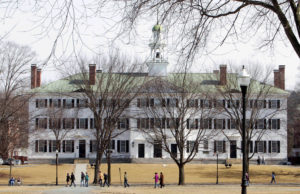
CONCORD, N.H. (AP) — As educational institutions across the country wrestle with their ties to slavery, Dartmouth College is taking a closer look at the darkest corners of its history.
The college plans to launch a “historical accountability” project this summer, which aims to better understand how marginalized groups, including African-Americans and other underrepresented students, have been treated since college was founded in 1769 by Eleazar Wheelock.
The institution will award fellowships to three undergraduate students to research the college’s historical record. Another team of students will work with faculty to map the archives and figure out ways to incorporate Dartmouth’s history into the college’s curriculum.
“We want to dig into the past that we’re not as proud of, but that shaped this place and created the culture that is still present,” said Jay Satterfield, head of the special collections library at Dartmouth. “By confronting our past failings, we’re better moving forward.”
The program drew inspiration from other institutions coming to terms with their past. Among the first to do so was Brown University, which exposed its past link to the Trans-Atlantic slave trade in a 2006 report. Four years ago, the Ivy League school celebrated its 250th anniversary and presented a slavery memorial that evoked a ball and broken chain, fashioned from cast-iron, sinking into the Earth.
Dartmouth is approaching the same milestone next year, which was one of the inspirations for taking a closer look at the school’s troubled history.
Wheelock was a congregational minister from Lebanon, Connecticut. His legacy lies in having carved the original campus out of the New Hampshire wilderness and teaching Native American students. But according to Morgan Swan, with the Rauner Special Collections Library, some archival discoveries could highlight the role Wheelock’s slaves played in building the original campus and how Dartmouth strayed from its mission to educate Native Americans.
Other potential projects could include Dartmouth’s first female students after Dartmouth became coed in 1972, transgender and gay students prior to the shift and the treatment of Asian students during World War II.
“While there is a story to tell about slavery and Dartmouth, there are others to tell about Dartmouth and Native Americans, Latinos, women, the LGBTQ community, religious minorities and many other perspectives the students will help to identify,” said Christianne Hardy, special assistant to the college’s president.
The college is approaching the concept of historical accountability in a more dynamic way than other schools by putting the project into the hands of students instead of historians. Satterfield is confident that by giving students ownership of the project, the impact will be powerful.
The program tackles only one of the goals laid out in a diversity initiative launched two years ago by Dartmouth, but many hope that by confronting its past, the college can work toward creating a more inclusive future.
“If we shy away from these types of stories, we’re doing a disservice to education,” Swan said.









More Stories
‘Target Fast’ boycott nears end as Black shoppers speak out: ‘I’m done for good’ – pridepublishinggroup.com
Colorado bill that would establish standards for Black history education passes House – KDVR
English’s Bill to Establish Statewide Black History Education Standards Passes House – Colorado House Democrats